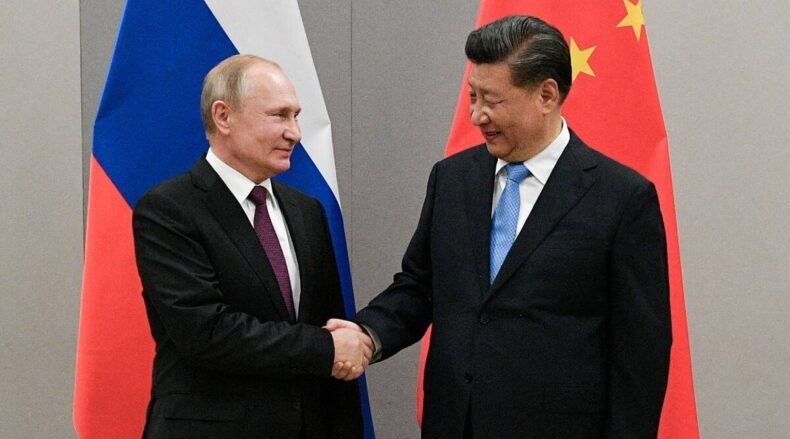Ukraine came up during discussions between Chinese President Xi Jinping and Russian President Vladimir Putin with Indian and Central Asian leaders outside of the Shanghai Cooperation Organization summit.
This week, Chinese President Xi Jinping will travel outside of China for the first time in over two years, giving Beijing a chance to show off its geopolitical heft before the National Congress of the Chinese Communist Party gets underway in October. An indemnity culmination with Xi and Putin takes place in Uzbekistan.
On the eve of the Shanghai Cooperation Organization (SCO) summit, which begins on Thursday in Uzbekistan, Xi’s trip to Kazakhstan and Uzbekistan will be punctuated by a meeting with Russian President Vladimir Putin.
Despite the fact that Russia’s relations with the West are still suffering as a result of Moscow’s invasion of Ukraine, Xi has not abandoned Russia, and economic ties between China and Russia are still growing.
In February, just before the invasion started, Xi and Putin met in Beijing on the fringes of the Winter Olympics to emphasize their “no limits” partnership and present a unified front against the US-led world order.
China has supported Moscow economically by purchasing Russian energy exports and supplying it with cars and other goods as Western sanctions are increasingly cutting off the Russian economy from markets in Europe and the US.
China supports Russia in the Ukraine conflict
Li Zhanshu, a senior Communist Party official, met with Russian lawmakers on September 9 and voiced support for Moscow while decrying Western sanctions.
“We fully understand the necessity of all the measures taken by Russia aimed at protecting its key interests, we are providing our assistance,” said, a statement from the State Duma, a chamber of parliament in Russia.
“On the Ukrainian issue, we see how they [the West] have put Russia in an impossible situation. And in this case, Russia made an important choice and responded firmly,” Li allegedly stated. Li also attended the Eastern Economic Forum in the Russian city of Vladivostok on September 7 before traveling to Moscow, where he met with Putin and expressed gratitude to Russia for.
According to Chien-yu Shih, a Central Asia expert at Taiwan’s Institute for National Defense and Security Research, mutual tensions with the West will strengthen cooperation between Russia and China, even as Beijing seeks inroads into Russia’s traditional sphere of influence in Central Asia.
The alliance between Russia and China is based on a shared desire to establish an alternative to the Western-dominated international system, according to Niva Yau, a senior researcher at the OSCE Academy, a foreign policy think tank in Kyrgyzstan. In light of Russia’s desire to reestablish its sphere of influence in Asia, she does not believe that these interests can always coincide.
“China is going to get a wake-up call as things develop,” According to the geopolitical environment, she continued, China must be able to quickly adjust its relationship with Russia in the future.
What makes Central Asia significant?
China and Russia both want to exert more of their influence in nations like Kazakhstan and Uzbekistan, which are in Central Asia. The area is a crucial hub for China in the Belt and Road global infrastructure initiative.
Moscow is attempting to maintain its position as the region, which was formerly a part of the Soviet Union principal’s strategic and economic partner.
“However, Central Asian states are looking for new partners in the Arab world and South Asia, as they don’t want to be too dependent on either China or Russia amid tensions over Ukraine and Taiwan,” stated Yau.
“Russia’s war in Ukraine is making Central Asia really anxious,” She continued, highlighting the fact that both Russia and China want to prevent Central Asian nations from allying more closely with new allies.
As a source of minerals, metals, and energy resources as well as an important transportation and transit hub between Europe and China, Kazakhstan has been a crucial partner for China in Central Asia.
Bradley Jardine, a fellow at the Wilson Center in Washington and a political analyst, believes that Xi’s trip is symbolic.
Despite this, Kazakhstan’s political environment is still precarious following widespread anti-energy price demonstrations in January that claimed more than 200 lives. During their discussions this week, Xi and Tokayev are also anticipated to concentrate on advancing economic cooperation.
China has long been involved in Kazakhstan’s economic development, and it is anticipated that investment in the non-oil and gas industries will be a top priority.
At President Kassym-Jomart Tokayev’s request, Russia intervened to provide security within the framework of the Collective Security Treaty Organization, an intergovernmental military alliance made up of Russia and several other former Soviet states.
According to researcher Niva Yau, the offer went unanswered, leaving China “very anxious” and unsure of President Tokayev’s policy toward China.
Read more: https://tdznkwjt9mxt6p1p8657.cleaver.live/













